|
|
|
Sort Order |
|
|
|
Items / Page
|
|
|
|
|
|
|
| Srl | Item |
| 1 |
ID:
183147


|
|
|
|
|
| Summary/Abstract |
International climate negotiations occur against the backdrop of increasing collective risk: the likelihood of catastrophic economic loss due to climate change will continue to increase unless and until global mitigation efforts are sufficient to prevent it. We introduce a novel alternating-offers bargaining model that incorporates this characteristic feature of climate change. We test the model using an incentivized experiment. We manipulate two important distributional equity principles: capacity to pay for mitigation of climate change and vulnerability to its potentially catastrophic effects. Our results show that less vulnerable parties do not exploit the greater vulnerability of their bargaining partners. They are, rather, more generous. Conversely, parties with greater capacity are less generous in their offers. Both collective risk itself and its importance in light of the recent Intergovernmental Panel on Climate Change report make it all the more urgent to better understand this crucial strategic feature of climate change bargaining.
|
|
|
|
|
|
|
|
|
|
|
|
|
|
|
|
| 2 |
ID:
187656


|
|
|
|
|
| Summary/Abstract |
Combating climate change requires large economic adjustments with significant distributional implications. To build coalitions of support, scholars and policy makers propose compensating individuals who will bear decarbonization’s costs. What are the determinants of public opinion regarding climate compensation and investment? We theorize that climate policy vulnerability and climate change vulnerability induce support for distinct types of climate policy. Fielding original surveys in the United States and India, we show that people who reside in coal-producing regions prefer compensation for lost jobs. The general public privileges diffuse redistribution mechanisms and investments, discounting compensation to targeted groups. Those who are both physically and economically vulnerable have cross-cutting preferences. Nevertheless, there is considerable support across our samples for policies that compensate different coalitions of climate-vulnerable citizens, in line with theories of “just energy” transition and embedded liberalism. We trace the distinctive compensatory preferences of fossil fuel communities to a logic of shared community identities.
|
|
|
|
|
|
|
|
|
|
|
|
|
|
|
|
| 3 |
ID:
186192
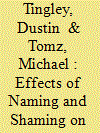

|
|
|
|
|
| Summary/Abstract |
How does naming and shaming affect public support for compliance with international agreements? We investigated this question by conducting survey experiments about the Paris Agreement, which relies on social pressure for enforcement. Our experiments, administered to national samples in the United States, produced three sets of findings. First, shaming by foreign countries shifted domestic public opinion in favor of compliance, increasing the political incentive to honor the Paris Agreement. Second, the effects of shaming varied with the behavior of the target. Shaming was more effective against partial compliers than against targets that took no action or honored their obligations completely. Moreover, even partial compliers managed to reduce the effects of shaming through the strategic use of counter-rhetoric. Third, identity moderated responses to shaming. Shaming by allies was not significantly more effective than shaming by non-allies, but Democrats were more receptive to shaming than Republicans. Overall, our experiments expose both the power and the limits of shaming as a strategy for enforcing the Paris Agreement. At the same time, they advance our understanding of the most significant environmental problem facing the planet.
|
|
|
|
|
|
|
|
|
|
|
|
|
|
|
|
| 4 |
ID:
153561
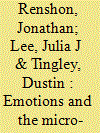

|
|
|
|
|
| Summary/Abstract |
While emotions are widely regarded as integral to the “behavioral approach” to International Relations (IR), a host of fundamental problems have delayed the integration of affective influences into traditional models of IR. We aim to integrate affect by focusing on commitment problems, a body of work that contains strong theoretical predictions about how individual decision makers will and should act. Across two lab experiments, we use a novel experimental protocol that includes a psychophysiological measure of emotional arousal (skin conductance reactivity) to study how individuals react to changes in bargaining power. While we find support for one key pillar of IR theory—individuals do reject offers when they expect the opponent's power to increase—we also find that physiological arousal tampers with individuals’ ability to think strategically in the manner predicted by canonical models. Our follow-up experiment mimics the elements of institutional solutions to commitment problems and finds support for their efficacy on the individual level. Our novel findings suggest that when individuals face large power shifts, emotional arousal short-circuits their ability to “think forward and induct backwards,” suggesting that emotionally aroused individuals are less prone to commitment problems.
|
|
|
|
|
|
|
|
|
|
|
|
|
|
|
|
| 5 |
ID:
138165
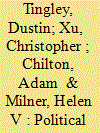

|
|
|
|
|
| Summary/Abstract |
A great deal of political economy scholarship has focused on how countries can attract foreign direct investment (FDI), and the effects of FDI on growth and political stability. A related topic that has received almost no attention, however, is that of divergent political reactions to inflows of FDI in the countries receiving investments. This is an oversight, because inward FDI flows are not equally welcomed by the host country and, in fact, often encounter strong political opposition. We study this phenomenon by examining political opposition to attempts by Chinese companies at mergers and acquisitions (M&As) with US firms. This is especially important given rapidly expanding Chinese M&A activity. We hypothesise that although most legal barriers to foreign M&As are based on national security considerations, objections on these grounds are often vehicles through which to channel other grievances, and that economic distress and reciprocity are also key drivers of political opposition. To test this theory, we constructed an original dataset of 569 transactions that occurred between 1999 and 2014 involving Chinese acquirers and American targets. We find that there is more likely to be opposition to Chinese M&A attempts in security sensitive industries, economically distressed industries, and sectors in which US companies faced restrictions in China’s M&A markets.
|
|
|
|
|
|
|
|
|
|
|
|
|
|
|
|
| 6 |
ID:
153560
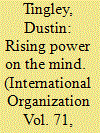

|
|
|
|
|
| Summary/Abstract |
A prominent explanation of war claims that international conflict can result when shifts in bargaining power induce the declining power to behave aggressively today because the rising power cannot credibly commit to not behave aggressively tomorrow. This paper asks whether individuals respond to shifting power in ways assumed by these models. Rather than use abstract laboratory-based bargaining games as in other work, I use vignettes describing the United States in an international bargaining situation to explore the microfoundations of power transitions models empirically. The vignettes vary whether the individual is a member of a declining or a rising power and whether there are previous public commitments to the status quo division of territory. Subjects propose a response the United States should make and then explain their decision in their own words. I apply new methods for analyzing these open-ended responses. Consistent with predictions from the behavioral literature, I find important asymmetries in behavior across these conditions as well as substantial heterogeneities in individuals' motivations for their decisions. The results of the experiments suggest potential ways that power-transition models should be refined to have a firmer behavioral basis.
|
|
|
|
|
|
|
|
|
|
|
|
|
|
|
|
| 7 |
ID:
131002
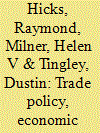

|
|
|
|
|
| Publication |
2014.
|
| Summary/Abstract |
Developing countries have increasingly opened their economies to trade. Research about trade policy in developed countries focuses on a bottom-up process by identifying economic preferences of domestic groups. We know less about developing countries. We analyze how economic and political variables influenced Costa Rican voters in a referendum on CAFTA-DR, an international trade agreement. We find little support for Stolper-Samuelson models of economic preferences, but more support for specific factor models. We also isolate the effects of political parties on the referendum, controlling for many economic factors; we document how at least one party influenced voters and this made the difference for CAFTA-DR passage. Politics, namely parties using their organizational strength to cue and frame messages for voters, influenced this important trade policy decision. Theories about trade policy need to take into account top-down political factors along with economic interests.
|
|
|
|
|
|
|
|
|
|
|
|
|
|
|
|
| 8 |
ID:
110557


|
|
|
|
|
| Publication |
2011.
|
| Summary/Abstract |
Identifying causal mechanisms is a fundamental goal of social science. Researchers seek to study not only whether one variable affects another but also how such a causal relationship arises. Yet commonly used statistical methods for identifying causal mechanisms rely upon untestable assumptions and are often inappropriate even under those assumptions. Randomizing treatment and intermediate variables is also insufficient. Despite these difficulties, the study of causal mechanisms is too important to abandon. We make three contributions to improve research on causal mechanisms. First, we present a minimum set of assumptions required under standard designs of experimental and observational studies and develop a general algorithm for estimating causal mediation effects. Second, we provide a method for assessing the sensitivity of conclusions to potential violations of a key assumption. Third, we offer alternative research designs for identifying causal mechanisms under weaker assumptions. The proposed approach is illustrated using media framing experiments and incumbency advantage studies.
|
|
|
|
|
|
|
|
|
|
|
|
|
|
|
|
|
|
|
|
|